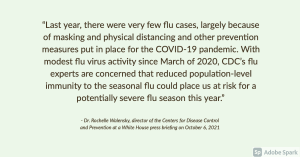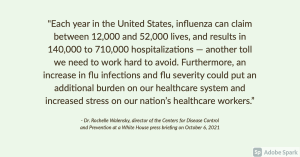Local health experts are concerned that we are entering a potentially severe flu season. After a slow 2019-20 flu season, the typical barrier of natural immunity may not be as strong.
The 2019-20 flu season started with a slow increase of cases in the fall, a growing number in November and higher numbers through the beginning of the new year. Then, in mid-March, cases plummeted as flu stepped aside for a new respiratory virus: COVID-19.
Why It’s Newsworthy: While COVID-19 stayed front and center through 2020, flu cases were abnormally low through the 2020-21 flu season. But the current 2021-22 season may be “potentially severe,” said Rochelle Walenskey, director of the Centers for Disease Control and Prevention, at a White House briefing on October 6, 2021.
“We really didn’t have a flu season last year,” said Mark Tompkins, director of UGA’s Center for Influenza Disease and Emergence Research (CIDER), which receives funding from the National Institutes of Health to conduct domestic and global research on the flu.
Right now, levels of influenza are low and on par with a normal flu season, Tompkins said via Zoom.
“Are those cases going to come up this month or next December? Are they going to stay flat again? We really just don’t know at this point,” Tompkins said.
A 2020-21 Anomaly
Several potential factors made the 2020-21 flu season an anomaly, including COVID-19 precautions like masking, social distancing and working from home.
“People weren’t out there sneezing on each other and touching things unprotected,” said Laurie Gibson, a nurse and infection control coordinator for St. Mary’s Health Care System based in Athens. “I believe the [COVID-19] precautions that were in place impacted the numbers we saw.”
COVID-19 could have interfered with flu infections, Tompkins said, since they are both respiratory viruses.
“If you get an infection with a respiratory virus, for example, you might become resistant, at least for a short period of time, from being infected with another [respiratory] virus,” Tompkins said. “So it might mean that so many people were infected with Coronavirus that it also blunted the opportunity for flu to be infecting and spreading to the population.”
The Other Side of the Coin

Similar factors that influenced the flu in 2020-21 may fuel the flu’s resurgence in 2021-2020.
“With COVID still being out there and still being a threat, any concurrent illnesses is going to cause an increase in hospitalizations,” Gibson said via Zoom.
Coupled with COVID-19’s lingering presence is a decline in the social distancing measures that were present during the 2020-21 season.
“We do have to take into consideration that we are right next to UGA. There’s a lot of international students. There’s a lot of traveling for football games and things like that,” said Cheyenne Candelario, an employee health nurse with St. Mary’s, via Zoom. “So it is a pretty high-transition area when you think about 90,000 people at a stadium on a Saturday. That could be a hub for flu. That could be a hub for COVID.”

And then there’s factors that are harder to see, like the influence — or lack thereof — of natural immunity.
“The reason we’re worried about it being a severe flu season is that we’ve gone an entire year without people getting naturally infected,” Tompkins of UGA’s CIDER said. “We’ve lost that barrier of people who are less susceptible.”
The CDC predicts that between 3% to 8% of the U.S. population gets the flu each year. Natural immunity, while not “worse or better” than immunity from the flu vaccine, is different, Tompkins said. Natural immunity provides broader coverage that may last longer than immunity from the flu vaccine, Tompkins said.
“An Incredibly Good Vaccine”
Vaccines have been a hot topic throughout 2021. The distribution of the COVID-19 vaccine unearthed questions, concerns and conflict. But the flu vaccine, though updated every year, is nothing new, Tompkins said.
As we’ve seen with the COVID-19 vaccine, the flu vaccine won’t completely eliminate infections, but it can reduce a person’s chance of getting really sick with the flu.
“Vaccines are not a cure-all. It’s never gonna be 100% effective,” Candelario said.“There are some people that say, ‘Well, I got the vaccine but I still got the flu.’ The whole idea behind it is you’re trying to prevent the catching of the virus as well as minimizing the severity of symptoms.”
Northeast Georgia residents interested in getting the flu vaccine can use the map below to reference nearby flu vaccine providers.
And for those who wait or keep forgetting to schedule an appointment, it isn’t too late.
“The day you get the flu vaccine is the best time to get it. If you can get it, go ahead and get it,” Tompkins said. “I think when they stop offering the vaccine is when it becomes too late.”
Caroline Odom is a senior majoring in journalism and risk management and insurance with a certificate in personal and organizational leadership.








Show Comments (0)